
Eliza Maud "Elsie" Inglis was a Scottish medical doctor, surgeon, teacher, suffragist, and founder of the Scottish Women's Hospitals. She was the first woman to hold the Serbian Order of the White Eagle.

The Elsie Inglis Memorial Maternity Hospital was a maternity hospital in Holyrood, Edinburgh, Scotland.
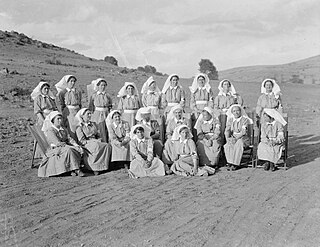
The Ostrovo Unit was a Field hospital unit with Transport Coloumn of the Scottish Women's Hospitals. It comprised approximately 200 tents and was situated near Lake Ostrovo, Macedonia during the First World War under the command of the Serbian Army. It was often called The America Unit as the money to fund it came from America and except for a few dressing stations, it was the Allied hospital nearest the front.

Agnes Elizabeth Lloyd Bennett was a New Zealand doctor, a Chief Medical Officer of a World War I medical unit and later was awarded an O.B.E. for her services in improving the health of women and children.

Isabel Galloway Emslie, Lady Hutton CBE was a Scottish physician who specialised in mental health and social work.

The Scottish Women's Hospitals for Foreign Services (SWH) was founded in 1914. It was led by Dr Elsie Inglis and provided nurses, doctors, ambulance drivers, cooks and orderlies. By the end of World War I, 14 medical units had been outfitted and sent to serve in Corsica, France, Malta, Romania, Russia, Salonika and Serbia.

The Scottish Women's Hospital at Royaumont was a medical hospital during World War I active from January 1915 to March 1919 operated by Scottish Women's Hospitals (SWH), under the direction of the French Red Cross and located at Royaumont Abbey. The Abbey is a former Cistercian abbey, located near Asnières-sur-Oise in Val-d'Oise, approximately 30 km north of Paris, France. The hospital was started by Dr Frances Ivens and founder of SWH, Dr Elsie Maud Inglis. It was especially noted for its performance treating soldiers involved in the Battle of the Somme.
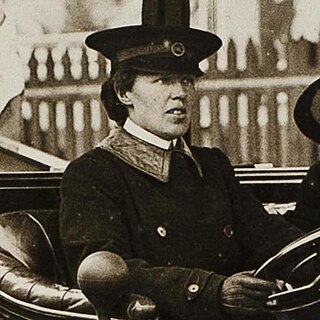
Vera Louise Holme, also known as Jack Holme, was a British actress and a suffragette. Born in Lancashire, she began working as a touring male impersonator when her parents could no longer support her. A talented violinist and singer, she also was a member of the chorus of the D'Oyly Carte Opera Company and later became a member of the Pioneer Players. After joining the Actresses' Franchise League, she became involved in the women's suffrage movement. She became the Pankhursts' chauffeur and the first professional woman driver in London.
Ysabel Hunter née Birkbeck (1890–1973) was a British ambulance driver and war memoirist. Her parents were Henry Birkbeck, a London-born banker, and Ysabel Birkbeck, a toymaker and philanthropist. Ysabel had a privileged upbringing, which she rejected in favour of art and wartime service during both the First and Second World Wars.

Sybil Lonie Lewis, OSS was an early Scottish female surgeon who served with distinction in Serbia during the First World War. In 1917 she helped to establish the Serbian Relief Fund.
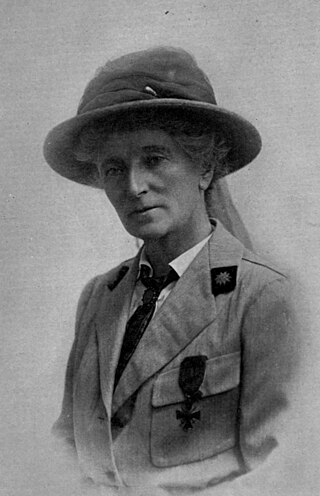
Katherine Mary Harley was a suffragist. In 1913 she proposed and organised the Great Pilgrimage on behalf of the National Union of Women's Suffrage Societies. During the First World War she helped to found and organise the Women's Emergency Corps.

Ruth Nicholson FRCOG was an English obstetrician and gynaecologist who served as a surgeon in the Scottish Women's Hospital at Royaumont, France during the First World War. For this work she was awarded the Croix de Guerre and the Médaille d’Honneur des Épidémies by the French government. After the war she specialised in obstetrics and gynaecology as Clinical Lecturer and Gynaecological Surgeon at the University of Liverpool with consultant appointments at Liverpool hospitals. She was a founder member of the Royal College of Obstetricians and Gynaecologists in 1929, being elevated to fellow of the college in 1931.

Eleanor Soltau (1877–1962) was an English doctor who led the first unit of the Scottish Women's Hospitals for Foreign Service in Serbia.
Elizabeth Bertram (1874-1954) was a nursing sister with the Scottish Women's Hospital for Foreign Service in Serbia and Corsica.

Mary H J Henderson was an administrator with Elsie Inglis's Scottish Women's Hospitals for Foreign Service in the Balkans in World War I, earning five medals. She founded social work and civic groups led by women, in Dundee, Aberdeen and London and served on charitable bodies including Dundee War Relief Fund, and worked for women's suffrage. She was also a war poet.
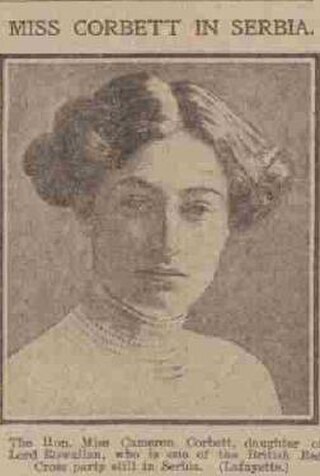
Elsie Cameron Corbett was a volunteer ambulance driver and major donor to the World War One Scottish Women's Hospital for Foreign Service in Serbia, She was a prisoner of war in 1916 and won medals from the Serbian and British governments. She was also a JP, a leading suffragist, temperance supporter, folklorist and diarist.
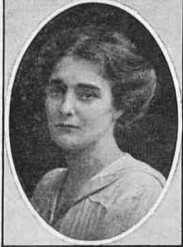
Olive Smith was a masseuse, physical training instructor in the Scottish Women's Hospitals for Foreign Service (SWH) in Serbia in World War I. She died of malaria, within two months of volunteering with Dr Agnes Bennett's SWH unit at Ostrovo, and is buried at the Allies cemetery in Thessaloniki. She is memorialised in her home town Haltwhistle and at the teacher training college she worked at, in Glasgow.
Muriel Craigie, OBE was a leading Scottish suffragist, honoured by two nations as a major volunteer organiser in both World Wars, and a 'noted educationist' during local authority education reforms.
Jean Aitken Bell was a Scottish nurse who served with Dr. Elsie Inglis's Scottish Women's Hospitals for Foreign Service in Serbia. She was among those who were given medals by both Britain and Serbia for war services, including enduring the dangerous winter mountain Serbian retreat, taking their injured patients over the mountains in winter to safety; she served July to December 1915.
Ishobel Ross was a Scottish nurse and diarist. During World War I she joined the Scottish Women's Hospitals for Foreign Service after hearing a lecture by Elsie Inglis. Ross spent a year on the Balkan front and kept a diary of her experiences. Her diary was later published as Little Grey Partridge: First World War Diary of Ishobel Ross Who Served with the Scottish Women's Hospitals in Serbia. Ross was born on the Isle of Skye and attended Edinburgh Ladies College.















